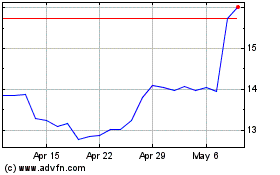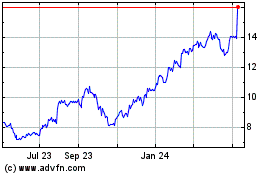Teva and Sanofi Announce Accelerated Timeline for Anti-TL1A Phase 2b Program in Patients with Inflammatory Bowel Disease
25 July 2024 - 3:30PM
Business Wire
- Enrollment acceleration drives earlier-than-anticipated data
availability for this potentially best-in-class IBD treatment
- Topline results for both UC and CD now anticipated in Q4
2024
- Teva and Sanofi are collaborating to co-develop and
co-commercialize duvakitug (anti-TL1A) for moderate-to-severe
ulcerative colitis (UC) and Crohn’s disease (CD) patients
Teva Pharmaceuticals, a U.S. affiliate of Teva Pharmaceutical
Industries Ltd. (NYSE and TASE: TEVA) and Sanofi today announced an
update to the timing for the anti-TL1A, duvakitug (formerly known
as TEV-’574/SAR447189) program investigating the human IgG1-λ2
monoclonal antibody targeting TL1A for moderate-to-severe IBD.
Patient enrollment in the RELIEVE UCCD (ulcerative colitis and
Crohn’s disease) Phase 2b trial has completed early due to
significant acceleration in patient recruitment. As a result, Teva
and Sanofi now anticipate having topline results for both UC and CD
in Q4 2024, and detailed results will be presented in a scientific
forum in 2025. This adjustment replaces the previously planned
interim analysis for the second half of 2024, which will not be
conducted. Teva and Sanofi are collaborating to co-develop and
co-commercialize duvakitug for moderate-to-severe UC and CD
patients.
About the Collaboration
On October 3, 2023, Teva and Sanofi entered into an exclusive
collaboration to co-develop and co-commercialize Teva’s duvakitug
(anti-TL1A) for the treatment of UC and CD, two types of IBD. Under
the terms of the agreement, in partial consideration of licenses
granted to Sanofi, Teva received an upfront payment of $500 million
shortly after closing and may receive up to $1 billion in
development and launch milestones. Each company will equally share
the remaining development costs globally and net profits and losses
in major markets, with other markets subject to a royalty
arrangement. Sanofi will lead the development of the Phase 3
program. Teva will lead commercialization of the product in Europe,
Israel and specified other countries, and Sanofi will lead
commercialization in North America, Japan, other parts of Asia and
the rest of the world.
About Inflammatory Bowel Disease
Inflammatory bowel disease (IBD) is a chronic autoimmune
disorder characterized by chronic inflammation of the
gastrointestinal (GI) tract. The two main types of IBD are
ulcerative colitis (UC) and Crohn’s disease (CD).1 UC and CD are
chronic inflammatory conditions of the GI tract characterized by
repetitive cycles of relapses and remission. Prolonged inflammation
can lead to damage within the GI tract, including fibrosis, a
common complication of IBD characterized by an excessive
accumulation of scar tissue in the intestinal wall, which may cause
narrowing and obstruction. Common symptoms of both conditions
include persistent diarrhea, rectal bleeding, abdominal pain, loss
of appetite, and weight loss. There is currently no cure for IBD –
the goal of treatment is to induce and maintain remission and
prevent flares.2 Globally, approximately 4.9 million cases of IBD
have been identified, with incidence rising in several
regions.3
About RELIEVE UCCD
RELIEVE UCCD is a 14-week Phase 2b, randomized, double-blind,
dose-ranging study to determine the pharmacokinetics, efficacy,
safety, and tolerability of duvakitug (anti-TL1A) in adults with
ulcerative colitis (UC) or Crohn's disease (CD). In the trial,
patients who meet pre-specified inclusion criteria are randomized
to subcutaneously receive either one of two duvakitug (anti-TL1A)
dose regimens or placebo in a 1:1:1 ratio (stratified by diagnosis
[UC or CD] and previous exposure to advanced IBD therapy [biologics
and small molecules]) for 14 weeks. Participants who complete the
14-week induction period have the option to enter the long-term
extension (LTE), consisting of a 44-week maintenance period for
responders and a re-induction period for non-responders. Primary
efficacy endpoints for both the 14-week and 44-week LTE study are
number of participants with moderate-to-severe UC who show clinical
remission (as defined by the modified Mayo score) and the number of
participants with moderate-to-severe CD who show an endoscopic
response (as defined by the endoscopic score for CD). The trial
includes sites in the U.S., Canada, Europe, and Asia.4,5
About Duvakitug (Anti-TL1A)
Duvakitug (anti-TL1A) is a potential best-in-class human IgG1-λ2
monoclonal antibody that targets tumor necrosis factor (TNF)-like
ligand 1A (TL1A), also known as TNF superfamily member 15
(TNFSF15). TL1A signaling is believed to amplify inflammation and
drives fibrosis associated with inflammatory bowel disease (IBD);
thus, targeting TL1A with duvakitug may mitigate the over-active
immune response in these conditions. Duvakitug (anti-TL1A) is
currently in Phase 2b clinical trials for the treatment of
ulcerative colitis (UC) and Crohn's disease (CD), two types of
inflammatory bowel disease. The safety and efficacy of duvakitug
(anti-TL1A) have not been reviewed by any regulatory authority.
About Teva
Teva Pharmaceutical Industries Ltd. (NYSE and TASE: TEVA) is a
global pharmaceutical leader with a category-defying portfolio,
harnessing our generics expertise and stepping up innovation to
continue the momentum behind the discovery, delivery, and expanded
development of modern medicines. For over 120 years, Teva's
commitment to bettering health has never wavered. Today, the
company’s global network of capabilities enables its 37,000
employees across 58 markets to push the boundaries of scientific
innovation and deliver quality medicines to help improve health
outcomes of millions of patients every day. To learn more about how
Teva is all in for better health, visit www.tevapharm.com.
Cautionary Note Regarding Forward-Looking Statements
This press release contains forward-looking statements within
the meaning of the Private Securities Litigation Reform Act of
1995, which are based on management’s current beliefs and
expectations and are subject to substantial risks and
uncertainties, both known and unknown, that could cause our future
results, performance or achievements to differ significantly from
that expressed or implied by such forward-looking statements. You
can identify these forward-looking statements by the use of words
such as “should,” “expect,” “anticipate,” “estimate,” “target,”
“may,” “project,” “guidance,” “intend,” “plan,” “believe” and other
words and terms of similar meaning and expression in connection
with any discussion of future operating or financial performance.
Important factors that could cause or contribute to such
differences include risks relating to: our ability to successfully
compete in the marketplace, including our ability to achieve
expected results from investments in our product pipeline including
to successfully develop and commercialize our duvakitug (anti-TL1A,
TEV’574) asset for the treatment of ulcerative colitis and Crohn’s
disease, two types IBD; our exclusive collaboration with Sanofi;
the risk that we will incur significant costs in connection with
the development of anti-TL1A (duvakitug), which may exceed any
revenue generated by duvakitug (anti-TL1A); risks that regulatory
approvals and other requirements may delay the development and
commercialization of our duvakitug (anti-TL1A); our ability to
successfully execute our Pivot to Growth strategy, including to
expand our innovative and biosimilar medicines pipeline and
profitably commercialize the innovative medicines and biosimilar
portfolio, whether organically or through business development, and
to sustain and focus our portfolio of generics medicines; and other
factors discussed in our Quarterly Report on Form 10-Q for the
first quarter of 2024 and in our Annual Report on Form 10-K for the
year ended December 31, 2023, including in the section captioned
“Risk Factors.” Forward-looking statements speak only as of the
date on which they are made, and we assume no obligation to update
or revise any forward-looking statements or other information
contained herein, whether as a result of new information, future
events or otherwise. You are cautioned not to put undue reliance on
these forward-looking statements.
______________________
- What is inflammatory bowel disease (IBD)? Centers for Disease
Control and Prevention. 2022. Available at:
https://www.cdc.gov/ibd/what-is-IBD.htm. Accessed July 2024.
- McDowell, C., Farooq, U., & Haseeb, M. (2020). Inflammatory
Bowel Disease (IBD). PubMed; StatPearls Publishing.
https://www.ncbi.nlm.nih.gov/books/NBK470312/. Accessed July
2024.
- Dharni, K., Singh, A., Sharma, S. et al. Trends of inflammatory
bowel disease from the Global Burden of Disease Study (1990-2019).
Indian Journal of Gastroenterology (2023).
https://doi.org/10.1007/s12664-023-01430-z.
- A Study to Test the Effect of TEV-48574 in Moderate to Severe
Ulcerative Colitis or Crohn's Disease (RELIEVE UCCD)
https://clinicaltrials.gov/study/NCT05499130?term=TEV-48574&rank=2.
Accessed July 2024.
- A Study to Evaluate the Long-Term Effect of TEV-48574 in
Moderate to Severe Ulcerative Colitis or Crohn's Disease.
https://clinicaltrials.gov/study/NCT05668013?term=TEV-48574&rank=1.
Accessed July 2024.
View source
version on businesswire.com: https://www.businesswire.com/news/home/20240724693212/en/
IR Contacts Ran Meir +1 (267) 468-4475 Yael Ashman +972
(3) 914 8262 Sanjeev Sharma +1 (973) 658 2700
PR Contacts Kelley Dougherty +1 (973) 832-2810 Eden Klein
+972 (3) 906 2645
Teva Pharmaceutical Indu... (NYSE:TEVA)
Historical Stock Chart
From Dec 2024 to Jan 2025

Teva Pharmaceutical Indu... (NYSE:TEVA)
Historical Stock Chart
From Jan 2024 to Jan 2025
